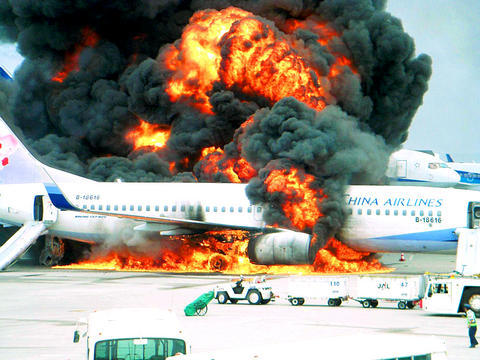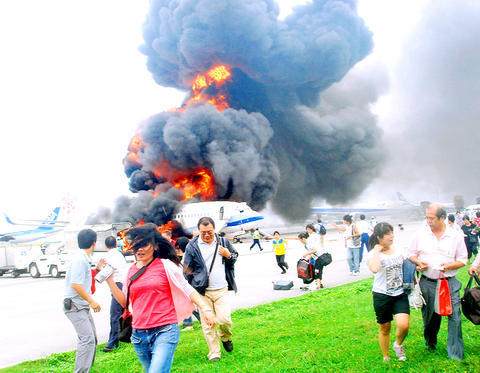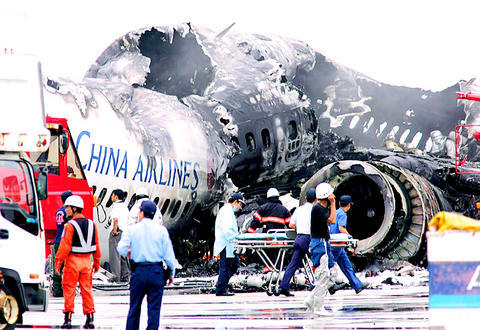A China Airlines Boeing 737-800 airliner burst into flames yesterday moments after landing on the Japanese island of Okinawa after all 165 passengers and crew made a dramatic escape.
Flames and giant plumes of black smoke erupted from the jet just after it landed at Naha Airport after a flight from Taipei.
"When we looked out the window, everything was covered with fire," an unidentified male passenger told reporters.

PHOTO: AP
"I saw several passengers evacuate the plane using a chute. After a minute or so, I heard the sound of an explosion. It was a big explosion," said Tadahiro Hasuo, who told Japanese TV network NHK he felt the heat of the blast while passing Naha airport in a taxi.
Video shot by an eyewitness and broadcast on TV showed passengers sliding down two chutes on the right side of the plane, while flames and thick black smoke billowed from the left.
Early investigations in Okinawa raised the possibility that leaking fuel may have caused the blaze.

PHOTO: AP
"We don't have any information that suggests the accident was linked to terrorism. There is a possibility of the engine catching fire and exploding due to a fuel leak," a Naha airport police official said.
One member of the ground crew had been injured, Kyodo news agency reported.
The flight landed using standard procedures and taxied to the designated gate, China Airlines spokesman Johnson Sun (孫鴻文) said at a news conference. The captain was later informed by the ground crew that one of the plane's engines was on fire and all 157 passengers and eight crew members were immediately evacuated by the emergency chutes, Sun said.

PHOTO: EPA
"We are very sorry and regret the accident," he said.
Following the explosion, the Civil Aviation Administration (CAA) and Aviation Safety Council (ASC) held press conferences in Taipei to assuage public fears.
CAA Director-General Billy Chang (張國政) said that based on Taiwan's Aviation Occurrence Investigation Act (飛航事故調查法), the authority to investigate the accident lay in Japan's Aircrafts and Railway Accidents Investigation Commission (ARAIC).
Nonetheless, the administration has formed a special task force and immediately dispatched three CAA officials to Japan to assist officials from the ARAIC in the investigation.
Chang said that the nation had 15 Boeing 737-800 model planes, 12 of which are owned by China Airlines, including the plane that burned in Okinawa. Two belong to Mandarin Airlines and one, Air Force One, is owned by the Air Force. He said that these planes had been grounded by the CAA for further inspection.
Chang said the plane that had caught fire was only five years old and had just completed its routine maintenance on July 13. He said that a preliminary investigation showed the flight's captain was informed by ground staff about the fire after the plane landed at the airport.
Meanwhile, four ASC representatives arrived at Okinawa yesterday evening to start working with ARAIC and China Airline representatives to identify the cause of the explosion.
China Airlines, Taiwan's largest carrier, purchased the B737-800 passenger jet in July 2002. The company uses the B737-800s in its fleet to fly mainly short-haul Asian routes.
James Fang (方粵強), the director of the ASC's investigation department, told the Taipei Times that this type of incident had never occurred in the past.
Most of the Taiwanese passengers on the plane had been on package tours arranged by four travel agencies in Taiwan -- South East Travel Service (東南旅行社), Gloria Tours (喜美旅行社), Daiei Travel Service (大榮旅行社) and Mic Travel Co (萬達旅行社). Their luggage was destroyed in the fire.
China Airlines said it would compensate passengers NT$1,000 per kilogram of luggage, with a maximum compensation of NT$20,000 in accordance with civil aviation regulations. Compensation for the passengers' mental suffering had not been decided.
China Airlines has a patchy safety record and this is the carrier's fourth accident in 13 years.
After devoting huge resources to improving safety and regaining public confidence, the company was starting to see some positive results.
Despite high aviation fuel costs, the company posted a net income of NT$738.35 million (US$22.5 million), or NT$0.20 per share, last year. Company chairman Philip Wei (魏幸雄) said its operating costs were lower because of a lower insurance premium, which was 45 percent less than what the carrier used to pay, because of its better flight safety record.
But the carrier is once again under fire over the accident in Okinawa. The airlines' already ailing finances will be also affected by the loss. For the first quarter of the year, the carrier reported a loss of NT$805.83 billion, or negative NT$0.21 per share.
Following the accident, China Airlines president Ringo Chao (趙國帥) led a team to Okinawa.
During a press briefing last night, Chao said he regretted the accident and appreciated the aid offered by Japanese authorities.
Chao also said the company was uncertain of the cause of the explosion and would rely on the findings of investigators.
The last accident involving China Airlines was on May 25, 2002, when a Boeing 747-200 broke up and crashed into the sea near the Penghu Islands 20 minutes after takeoff from Taipei on a flight to Hong Kong. The crash caused the death of all 206 passengers and 19 crew members.
Meanwhile, the Air Force yesterday said that it would carry out stricter maintenance on Air Force One, which is also a 737-800.
"Because of a request from the Civil Aeronautics Administration, we will carry out a special detailed check on the aircraft as soon as possible," said Lieutenant General Jason Liu (
Additional reporting by Jimmy Chuang

Intelligence agents have recorded 510,000 instances of “controversial information” being spread online by the Chinese Communist Party (CCP) so far this year, the National Security Bureau (NSB) said in a report yesterday, as it warned of artificial intelligence (AI) being employed to generate destabilizing misinformation. The bureau submitted a written report to the Legislative Yuan in preparation for National Security Bureau Director-General Tsai Ming-yen’s (蔡明彥) appearance before the Foreign Affairs and National Defense Committee today. The CCP has been using cognitive warfare to divide Taiwanese society by commenting on controversial issues such as Taiwan Semiconductor Manufacturing Co’s (TSMC, 台積電) investments in the

HELPING HAND: The steering committee of the National Stabilization Fund is expected to hold a meeting to discuss how and when to utilize the fund to help buffer the sell-off The TAIEX plunged 2,065.87 points, or 9.7 percent, to close at 19,232.35 yesterday, the highest single-day percentage loss on record, as investors braced for US President Donald Trump’s tariffs after an extended holiday weekend. Amid the pessimistic atmosphere, 945 listed companies led by large-cap stocks — including Taiwan Semiconductor Manufacturing Co (TSMC, 台積電), Hon Hai Precision Industry Co (鴻海精密) and Largan Precision Co (大立光) — fell by the daily maximum of 10 percent at the close, Taiwan Stock Exchange data showed. The number of listed companies ending limit-down set a new record, the exchange said. The TAIEX plunged by daily maxiumu in just

INVESTIGATION: The case is the latest instance of a DPP figure being implicated in an espionage network accused of allegedly leaking information to Chinese intelligence Democratic Progressive Party (DPP) member Ho Jen-chieh (何仁傑) was detained and held incommunicado yesterday on suspicion of spying for China during his tenure as assistant to then-minister of foreign affairs Joseph Wu (吳釗燮). The Taipei District Prosecutors’ Office said Ho was implicated during its investigation into alleged spying activities by former Presidential Office consultant Wu Shang-yu (吳尚雨). Prosecutors said there is reason to believe Ho breached the National Security Act (國家安全法) by leaking classified Ministry of Foreign Affairs information to Chinese intelligence. Following interrogation, prosecutors petitioned the Taipei District Court to detain Ho, citing concerns over potential collusion or tampering of evidence. The

‘COMPREHENSIVE PLAN’: Lin Chia-lung said that the government was ready to talk about a variety of issues, including investment in and purchases from the US The National Stabilization Fund (NSF) yesterday announced that it would step in to staunch stock market losses for the ninth time in the nation’s history. An NSF board meeting, originally scheduled for Monday next week, was moved to yesterday after stocks plummeted in the wake of US President Donald Trump’s announcement of 32 percent tariffs on Taiwan on Wednesday last week. Board members voted to support the stock market with the NT$500 billion (US$15.15 billion) fund, with injections of funds to begin as soon as today. The NSF in 2000 injected NT$120 billion to stabilize stocks, the most ever. The lowest amount it